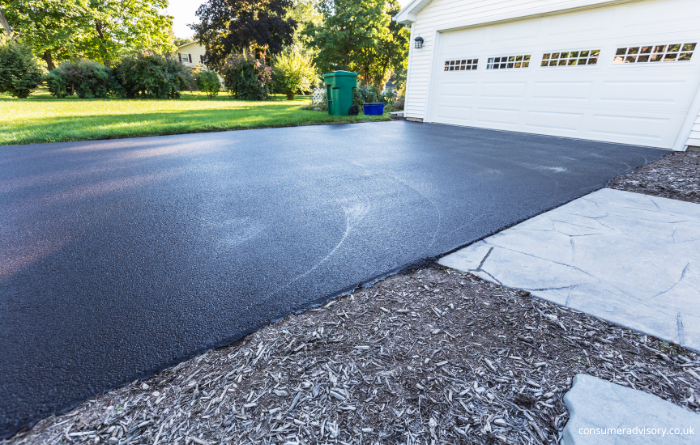
Resin driveways are becoming increasingly popular in the UK, thanks to their durability, low maintenance costs and attractive finish. However, there are a few disadvantages of resin driveways that you should be aware of before making a commitment.
These include being slippery when wet, being susceptible to staining and requiring a professional installation.
Here are the ten disadvantages of resin driveways that you need to be aware of before committing:
Let’s take a closer look at the ten key disadvantages of resin driveways.
One of the main disadvantages of resin driveways is that they can be quite slippery when wet. This means that you need to take extra care when walking on them, and you may want to consider installing some non-slip mats or tiles if you are concerned about safety.
Another downside of resin driveways is that they can be susceptible to staining from oil, grease and other materials. This means that you need to be careful about what you spill on them, and you may need to clean them more often than other types of driveways.
Unlike some other driveway materials, you will need to hire a professional to install a resin driveway. This can add to the overall cost of the project, but it is important to make sure that it is done correctly.
Resin driveways can be more expensive than other types of driveways, such as concrete or asphalt. This is because they require a professional installation, and the materials themselves are also more expensive.
Another disadvantage of resin driveways is that unlike gravel driveways, they require a smooth, level surface to be installed correctly. This means that you will need to prepare the ground before installation, and it may not be suitable for all types of terrain.
Resin driveways can crack in cold weather, so it is important to make sure that they are installed in an area that is not prone to extreme temperatures. Otherwise, you may need to replace them more often than other types of driveways.
If a resin driveway is damaged, it can be quite difficult to repair. This is because the material is designed to be hard and durable, so it is not easy to patch up or replace sections that are damaged.
If you have a very heavy vehicle, such as a van or motorhome, then a resin driveway may not be suitable. This is because the material is not as strong as some other driveway materials, so it could crack under the weight of the vehicle.
One of the disadvantages of resin driveways is that the colour may fade over time. This is because the material is exposed to the sun and other elements, which can bleach the colour. So, you may find that your driveway needs to be re-painted or re-sealed more often than other types of driveways.
While resin driveways are very strong and durable, they are not as durable as some other driveway materials. This means that they may need to be replaced more often, particularly in areas that experience extreme weather conditions.

Whilst there are several disadvantages of resin driveways that you need to consider, there are also many benefits of resin driveways. Let’s take a look at some of these benefits in more detail.
One of the main benefits of resin driveways is that they are low maintenance. This means that you won’t need to spend as much time and money on upkeep, and you can simply enjoy the look of your driveway without having to worry about it.
Another advantage of resin driveways is that they are easy to clean. You can simply hose them down or use a pressure washer to remove any dirt, grime or stains.
Resin driveways are also very durable, meaning that they will last for many years with proper care. This makes them a great investment for your home.
Resin driveways can also enhance the look of your home. They are available in a variety of colors and styles, so you can choose one that best suits your taste.
Another advantage of resin driveways is that they are environmentally friendly. This is because they are made from recycled materials, and they don’t produce any harmful emissions.
Resin driveways can also add value to your home, making it more attractive to potential buyers. This is because they are seen as a high-quality feature that can increase the curb appeal of a property.
Resin driveways also require no planning permission, so you won’t have to worry about getting approval from your local council.
Another advantage of resin driveways is that they are quick and easy to install. This means that you won’t have to wait long for your new driveway, and you can enjoy it as soon as it’s finished.
Resin driveways are also low noise, so you won’t have to worry about disturbing your neighbours when you arrive home.
Whilst there are many advantages of resin driveways, there are also some disadvantages that you will need to consider. These include the need for professional installation, potential for fading over time and that they can be slippery in wet weather. It’s important to weigh up the pros and cons of resin driveways to make the right decision for your property.
A properly installed and maintained resin driveway should last for many years – often around 25 years. However, it is worth noting that the colour may fade over time, and you may need to reseal or repaint the driveway every few years to keep it looking its best.
Resin driveways are a great investment for any property. They are low maintenance, durable and enhance the look of your home. If you are looking for a new driveway, then resin is definitely worth considering. However, it’s important to bear in mind that there are also some disadvantages of resin driveways that you will need to weigh up before deciding whether this is the right driveway material for you.
If a resin driveway has been installed correctly, weeds should not be able to grow through it. However, it’s important to keep on top of maintenance and remove any weeds that do appear as soon as possible.
Yes, you can pressure wash a resin driveway. However, you will need to take care not to damage the surface. It’s always best to follow the manufacturer’s instructions when cleaning your driveway.
The cost of a resin driveway will depend on a number of factors, such as the size of the driveway, the type of resin used and the company you choose to install it. However, you can expect to pay between £50 and £100 per square meter for a basic resin driveway.
A resin driveway won’t be the right decision for every home. Now that you know the advantages and disadvantages of resin driveways, you can decide if this is the right material for your property. Consider the climate, the look of your home, and your budget when making your decision. You should also talk to a professional to get their opinion on whether a resin driveway is right for you.
Copyright © 2025 Consumer Advisory. All rights reserved.